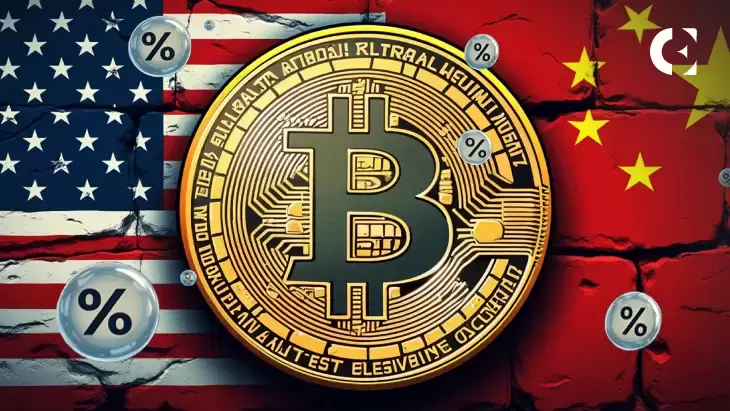 |
|
 |
|
 |
|
 |
|
 |
|
 |
|
 |
|
 |
|
 |
|
 |
|
 |
|
 |
|
 |
|
 |
|
 |
|
Cryptocurrency News Articles
Bitcoin Will Not Replace the US Dollar, Says Goldman Sachs CEO David Solomon
Jan 26, 2025 at 10:00 am
David Solomon, the CEO of Goldman Sachs, has expressed his belief that Bitcoin and other cryptocurrencies will not be able to dethrone the US dollar's position as the global currency.

David Solomon, CEO of Goldman Sachs, recently expressed his skepticism about Bitcoin and other cryptocurrencies dethroning the US dollar as the global currency. At an event, Solomon acknowledged the growing attention on Bitcoin and digital assets but highlighted their volatility, making them unsuitable to compete with traditional fiat currencies like the dollar.
These remarks come amid heated discussions on Bitcoin’s role in the financial system. While cryptocurrencies are gaining popularity, many in traditional finance remain cautious about their long-term viability. Solomon’s comments reflect the ongoing skepticism within established financial institutions regarding the stability and reliability of digital currencies.
One key point Solomon raised is Bitcoin’s extreme price fluctuations. He noted that Bitcoin’s unpredictable nature renders it unreliable both as a medium of exchange and a store of value. Despite many crypto enthusiasts arguing that Bitcoin’s decentralization is a major strength, Solomon sees its volatility as a key obstacle to its widespread adoption for everyday use.
“The dollar’s dominance is a result of trust and stability, which Bitcoin does not presently offer,” Solomon explained. His comments echo a broader critique of Bitcoin’s price instability, which has been a concern for many potential investors and users. While Bitcoin has certainly gained recognition and value over the years, its erratic price movements have hindered its consideration as a stable alternative to the US dollar.
Solomon also touched on the importance of clear regulation in the cryptocurrency space. He recognized the growing acceptance of digital assets but emphasized the need for a proper regulatory framework for cryptocurrencies to reach their full potential. Without clear laws and rules, institutional investors and corporations will remain hesitant to fully embrace crypto, according to Solomon.
The regulatory landscape for cryptocurrencies is still in its early stages, with many crypto proponents believing that clear and consistent regulation will be essential for fostering wider institutional adoption. As cryptocurrencies continue to garner attention, both positive and negative perspectives on their future persist, with regulatory clarity being a central point of contention.
Despite his skepticism about Bitcoin replacing the dollar, Solomon doesn’t see Bitcoin as a direct competitor to the US dollar. Instead, he believes that Bitcoin and fiat currencies can coexist. While the US dollar will likely remain the dominant currency for global trade, Bitcoin could serve a different role, such as a hedge against inflation or economic instability.
This view aligns with the argument that Bitcoin could be considered “digital gold” – a store of value in times of financial uncertainty. While it may not replace the US dollar as the primary means of exchange, Bitcoin could offer an alternative investment option for those seeking to diversify their portfolios or protect their wealth from inflation.
Solomon’s comments reflect a more cautious approach from Wall Street when it comes to embracing cryptocurrency. While financial institutions like Goldman Sachs have shown some interest in digital assets, they are still wary of the risks involved. The relationship between traditional finance and the crypto world remains complex, with both sides slowly finding common ground.
Goldman Sachs, for instance, has made moves to observe and engage with the crypto market, even as it remains cautious about its long-term impact. This is indicative of a broader trend in Wall Street, where skepticism coexists with a growing curiosity about the potential of blockchain technology and digital assets.
As more institutional investors and governments begin to explore the potential of digital currencies, it is evident that the relationship between Bitcoin and traditional finance will continue to evolve. While the US dollar’s dominance remains unchallenged for now, Bitcoin’s role as a digital asset could change the way financial systems function in the future.
Regulation will play a key role in determining whether Bitcoin can complement or disrupt existing financial systems. As the crypto market matures and regulatory frameworks become clearer, Bitcoin and other digital assets may find a more defined place in the global economy.
Disclaimer:info@kdj.com
The information provided is not trading advice. kdj.com does not assume any responsibility for any investments made based on the information provided in this article. Cryptocurrencies are highly volatile and it is highly recommended that you invest with caution after thorough research!
If you believe that the content used on this website infringes your copyright, please contact us immediately (info@kdj.com) and we will delete it promptly.
-

-

-

- The Crypto Market's Been Cooking Up Fresh Narratives This Year—from Bitcoin Crossing All-Time Highs to Solana's Gasless Memecoin Mania
- Apr 12, 2025 at 12:30 pm
- The crypto market's been cooking up fresh narratives this year—from Bitcoin crossing all-time highs to Solana's gasless memecoin mania. But here's what's flying under the radar
-

-

- Today, the broader cryptocurrency market experienced a significant sell-off, erasing $314.69 million in liquidations.
- Apr 12, 2025 at 12:25 pm
- Today, the broader cryptocurrency market experienced a significant sell-off, erasing $314.69 million in liquidations. According to metrics shared by Phoenix Group, a total of 108138 traders were liquidated
-

-

-

-




















![Crypto Otaku - CRYPTO CHAOS! 83K BITCOIN! CRYPTO RALLY!! XCN , JASMY , SWFTC LEAD!!! [Episode 228] Crypto Otaku - CRYPTO CHAOS! 83K BITCOIN! CRYPTO RALLY!! XCN , JASMY , SWFTC LEAD!!! [Episode 228]](/uploads/2025/04/12/cryptocurrencies-news/videos/crypto-otaku-crypto-chaos-k-bitcoin-crypto-rally-xcn-jasmy-swftc-lead-episode/image-1.webp)









































